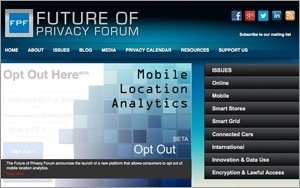 Brick-and-mortar shoppers who don't want to be being physically tracked via their smartphones are getting a new way to opt out.
Brick-and-mortar shoppers who don't want to be being physically tracked via their smartphones are getting a new way to opt out.
On Tuesday, the think tank Future of Privacy Forum
is launching a Web site, www.smartstoreprivacy.org, which will offer visitors the ability to opt out of location tracking by entering their phones'
12-digit WiFi or Bluetooth Media Access Control (MAC) address. Even though the new site goes live this week, opt outs won't take effect for at least 30 days.
As of Tuesday, a coalition of 11
mobile analytics companies have agreed to honor the opt-out requests. They include: Aislelabs, Brickstream, Euclid, iInside, Measurence, Mexia Interactive, Path Intelligence, Radius Networks, ReadMe
Systems, SOLOMO and Turnstyle Solutions. Future of Privacy Forum executive director Jules Polonetsky says he expects that additional companies will also agree to participate.
advertisement
advertisement
The Future of
Privacy Forum currently is working with companies to develop signs informing shoppers about the site. Polonetsky says that the signs are now being tested with consumers and should be available in the
next several months.
The analytics companies participating in the initiative agreed to follow a new privacy code, released in October. That code requires companies to allow people to opt out
of location tracking when the data is used solely for analytics purposes, as opposed to creating profiles of users.
In the past, some analytics companies allowed people to opt out of tracking
by visiting a site and entering a MAC address. But consumers could only do so on a company-by-company basis.
The new initiative comes on the eve of a Federal Trade Commission seminar devoted to privacy issues posed by mobile device tracking. The agency will
explore questions, including the potential future use of device tracking technologies, the type of information retailers gain and the privacy and security risks posed by location tracking.
Some
observers, including Sen. Al Franken (D-Minn.), take the position that location tracking should require users' opt-in consent.
Polonetsky says the Future of Privacy Forum takes the view that
companies should be able to use aggregated data solely for analytics purposes without first obtaining explicit consent. “The opt-out here is a safety valve for the privacy concern,” he
says.
Currently, retailers and mall owners tend to use location data in order to assess traffic patterns, both within stores and shopping centers. For instance, the data can show the extent to
which an anchor store in a mall drives traffic to other, smaller stores.
The platform was built by The Wireless Registry, which allows people or companies with WiFi addresses to associate
names with their networks. The new opt-out site doesn't require consumers to provide their names.